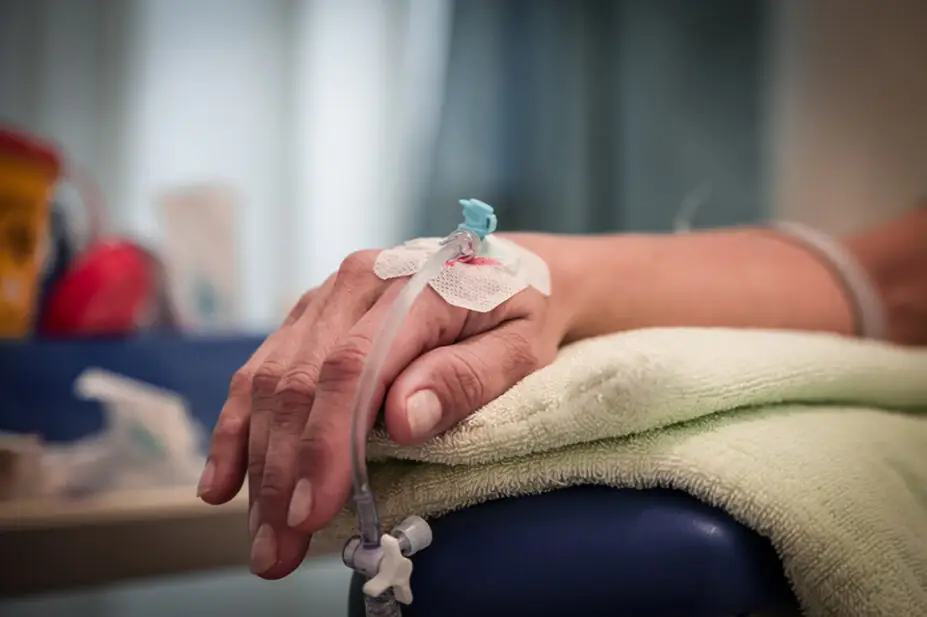
Shutterstock.com
The National Institute for Health and Care Excellence (NICE) has recommended a new targeted treatment for advanced bladder cancer for immediate use on the NHS in England.
On 21 August 2025, NICE announced that it approved a combination treatment that consists of enfortumab vedotin (Padcev; Astellas) and pembrolizumab (Keytruda; MSD) for use in England to treat unresectable or metastatic (i.e. stage four) urothelial cancer for people who are eligible for platinum‑containing chemotherapy.
An estimated 1,200 people or more each year could benefit from the new treatment, NICE said.
Clinicians and patient groups have welcomed the news, since previous treatments available to this cohort have been limited.
In a press release published on the same day as the announcement, Thomas Powles, lead researcher on the treatment, commented: “Prior to the EV-302 clinical trial, the treatment of advanced bladder cancer hadn’t significantly changed since the 1980s. This guidance will fundamentally reshape first-line treatment for eligible patients.”
Stuart John Evans, advanced pharmacist at NHS Wales, told The Pharmaceutical Journal: “This is a completely novel and treatment pathway changing recommendation.
“Prior to this guidance, bladder cancer patients would receive platinum-based chemotherapy regimen with limited success,” he said.
“We now have drugs with meaningful patient outcome benefits.”
More than 18,000 people in England are diagnosed with bladder cancer each year and only around 10% of people with stage 4 bladder cancer will survive five years or more after they are diagnosed, according to NICE.
Currently, around 12% of people on platinum-based chemotherapy see an improvement in their condition.
Diana Matthews, advanced oncology pharmacist and urology non-medical prescriber at Velindre Cancer Centre, told The Pharmaceutical Journal: “It’s fair to say, that even though there was some improvement in outcomes, [chemotherapy] has never had a massive impact on long-term disease control for the majority of those patients.”
According to the results of an ongoing, randomised clinical trial involving 886 adults, the combination treatment doubled progression-free survival from an average of 6.3 months for those on chemotherapy alone to 12.5 months for those on enfortumab vedotin and pembrolizumab.
Overall survival increased to a median of 33.8 months for those on the combination treatment compared with 15.9 months for those on chemotherapy, clinical trial researchers found.
Around 30% of people on the clinical trial achieved a complete remission following treatment with enfortumab vedotin and pembrolizumab.
“The excitement of being able to offer this to our patients is overwhelming,” Matthews added.
“A lot of clinicians will be having mixed feelings though, as with this new treatment there is also a new whole range of toxicities with which a lot of us won’t be familiar with, but I’m very confident that this will be the drive to get together members from medical, pharmacy and nursing teams to work with pharma to create protocols and guidelines across the UK.”
Jeannie Rigby, chief executive of charity Action Bladder Cancer UK, said the new treatment had “less hard to tolerate side effects” than current options, adding that the treatment was “long overdue”.
“This is welcome news for a badly neglected group of patients,” she added.
“There is a real unmet need for effective, and well-tolerated, treatments for bladder cancer.”
Georgia Moseley-Malesi, principal pharmacist for cancer services at the Russells Hall Hospital in Dudley, told The Pharmaceutical Journal that with increasing numbers of targeted treatments for other cancers, it was “really good to see that there’s more and more targeted treatments available to the bladder cancer cohort of patients”.
The new treatment offered patients an alternative to going back to a treatment they had tried before and potentially not tolerated well, she said.
Moseley-Malesi added that shorter infusion times with the new treatment should “significantly” shorten oncology day visits for this group of patients, meaning they spend less time in hospital and increasing capacity within oncology day units.
She stressed the importance of training being included in pharmacist job plans, as pharmacists in all clinical areas increasingly needed to stay up to date with training and new treatments.
“It’s a matter of clinical safety,” Moseley-Malesi said.
Other treatments for bladder cancer are currently going through the NICE approval process, including durvalumab (Imfinzi; AstraZeneca) with gemcitabine (Gemzar; Lilly) and cisplatin before surgery (i.e. neoadjuvant) and nivolumab (Opdivo; Bristol Myers Squibb) with ipilimumab (Yervoy; Bristol Myers Squibb) for untreated unresectable or metastatic urothelial cancer, and others.


